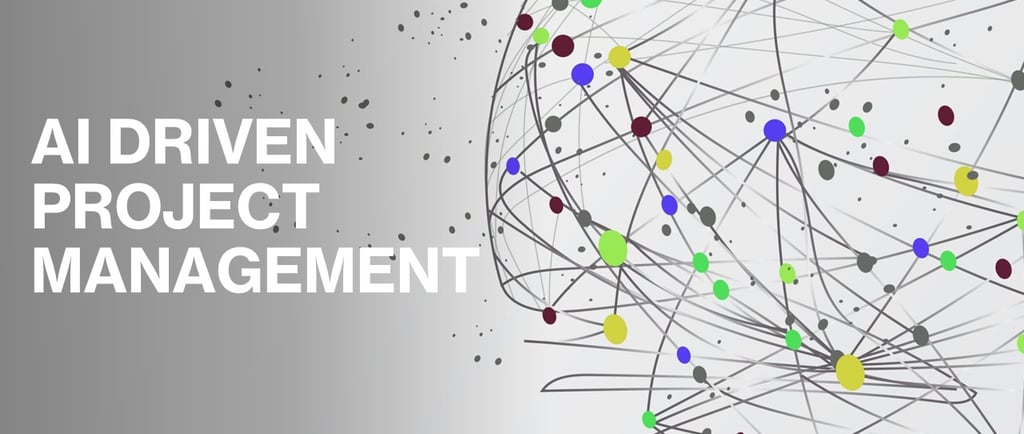AI Driven Project Management
How AI and Automation Are Transforming Project Management
Vikram Kaushik
3/13/20254 min read


How AI and Automation Are Transforming Project Management
Project management is evolving rapidly, and artificial intelligence (AI) and automation are at the forefront of this transformation. Traditionally, managing a project required significant manual effort—tracking progress, assigning tasks, mitigating risks, and ensuring deadlines were met. However, as projects become more complex and deadlines tighter, AI is stepping in to enhance efficiency, improve accuracy, and support better decision-making.
AI and automation are not just about replacing manual tasks; they are redefining how teams collaborate, predict challenges, and optimize resources. From intelligent scheduling to AI-powered risk assessment, these technologies are making project management smarter and more agile. Let’s explore how AI is reshaping the field and what this means for the future of project management.
Smarter Planning and Scheduling
One of the most challenging aspects of project management is creating a realistic timeline and ensuring that all moving parts align. Traditionally, project managers relied on past experiences, spreadsheets, and static tools to develop schedules. This approach, while effective, had limitations—it often led to underestimated timelines, overlooked dependencies, and inefficient resource allocation.
AI is changing this by introducing predictive scheduling. Modern project management platforms leverage AI to analyze historical data and real-time project variables to suggest the most efficient timeline. These tools consider factors such as team productivity, past project performance, and potential risks to provide a dynamic, data-driven schedule.
Another way AI is enhancing planning is through automated resource allocation. By analyzing workload distribution, AI ensures that team members are neither overburdened nor underutilized. If someone is assigned too many tasks, AI can redistribute them automatically. This leads to better efficiency and prevents burnout, which is a common issue in project teams.
Automating Repetitive Tasks
One of AI’s most immediate benefits in project management is reducing time spent on repetitive administrative tasks. These tasks, while necessary, consume hours that could be spent on more strategic work. AI-powered automation now handles many of these responsibilities, making workflows smoother and more efficient.
For example, using platforms, AI can automatically:
Assign tasks to team members based on workload and skill set.
Send reminders and follow-ups for upcoming deadlines.
Generate reports on project progress, eliminating the need for manual updates.
Adjust project timelines dynamically when unexpected changes occur.
AI-powered chatbots and virtual assistants are also making an impact. These tools can handle routine inquiries, provide status updates, and even schedule meetings without human intervention. This allows project managers to focus on problem-solving and decision-making rather than administrative work.
AI-Powered Decision Making
Effective project management depends on quick and informed decision-making. AI is revolutionizing this by offering predictive analytics, which helps project managers anticipate issues before they arise.
AI tools analyze vast amounts of project data, identifying potential risks such as budget overruns, timeline delays, and resource shortages. Instead of waiting for issues to emerge, project managers can take proactive measures to address them early.
Another breakthrough is AI-driven scenario planning. Advanced AI models can simulate different project paths, helping teams choose the most effective strategy. For example, if a key team member is unavailable, AI can predict the impact on the project and suggest alternative resource allocations.
Enhanced Team Collaboration with AI Assistants
Communication is at the heart of successful project management, and AI is making collaboration more seamless. AI-powered virtual assistants and chatbots are now integrated into communication platforms, ensuring that teams stay informed and aligned.
AI-driven chatbots can:
Provide instant project updates when a team member asks about the status of a task.
Automate meeting scheduling by analyzing team members' availability.
Identify communication patterns to detect team morale issues, helping managers address conflicts before they escalate.
For remote and hybrid teams, AI ensures that everyone stays on the same page, reducing miscommunication and delays.
Improving Risk Management
Risk is inevitable in project management, but AI is making it easier to identify and mitigate risks before they become major issues.
Machine learning algorithms scan through past project data to detect patterns that indicate potential risks. AI can then:
Alert project managers about budget overruns before they happen.
Predict employee burnout by analyzing work patterns.
Suggest contingency plans when risks are detected.
AI can also perform sentiment analysis by evaluating team communication. If AI detects signs of stress or frustration in emails, chat messages, or meeting notes, it can notify project managers to step in before issues escalate.
Challenges of AI in Project Management
Despite its many advantages, AI adoption in project management comes with challenges.
One significant issue is data privacy and security. AI tools rely on vast amounts of project data, some of which may be sensitive. Companies must implement strict cybersecurity measures to prevent breaches.
Another challenge is the learning curve. Many teams struggle to adapt to AI-driven project management tools. Proper training is essential to ensure that AI enhances, rather than disrupts, project workflows.
Additionally, AI is not infallible. While it can predict outcomes and optimize processes, human judgment remains irreplaceable. AI cannot fully understand complex interpersonal dynamics, creativity, or ethical considerations—areas where human project managers excel.
The Future of AI in Project Management
AI and automation are not just improving project management; they are redefining it. As AI technology evolves, we can expect even greater advancements in:
Self-learning AI systems that adapt to unique project challenges.
More advanced predictive analytics that offer near-perfect risk assessments.
AI-driven creative problem-solving tools that suggest innovative project strategies.
However, the key to successful AI adoption lies in balancing automation with human expertise. While AI can optimize efficiency, it is ultimately the human touch—creativity, leadership, and emotional intelligence—that will drive project success.
Organizations that embrace AI today will gain a competitive edge by completing projects faster, with fewer errors, and greater efficiency. But AI should be seen as a collaborator, not a replacement. The future of project management belongs to those who can leverage technology while maintaining the human connection that makes projects truly successful.
